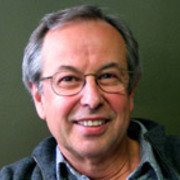
Simon Reece
Christchurch-raised Simon Reece joined the NZ Broadcasting Corporation in the mid 1960s. Reece originally wanted to be a set designer, and heard there was a job at the NZBC. The job was in accounts, but Reece reckoned that the key with government departments was getting inside the door, then moving across to where you wanted to be.
During the interview he discovered there was also a position in editing. After explaining to the CHTV station manager what editing actually meant, Reece got the job.
Reece worked on commercials, news, regional magazine show Town and Around — and also unfinished feature film Frank, directed by his older brother Murray and shot by Alun Bollinger.
Sound and picture was often mixed in live, as shows went to air. When the time came to mix the soundtrack for John A Lee doco An Angel Slightly Battered, Reece had to head for Wellington, since Christchurch didn't have the necessary sound mixing equipment.
Reece's earliest drama assignments included editing location footage for landmark 70s series Pukemanu, and sneaking indie filmmaker Geoff Murphy into the NZBC edit suite at night, to work on early short Tank Busters. In 1972 Reece cut acclaimed fantasy An Awful Silence. Featuring a young Susan Wilson, the one-off play was one of the first local productions filmed in colour.
Reece was just 25. "That was what was happening here...we were just plunged into it, to work things out."
Soon after, Reece went off for an OE in Australia and England. He spent a short time helping churn out cop shows at Crawford Productions in Australia, but had more fun working on mining films for businessman Alan Bond.
By the mid 70s New Zealand television was heading into a period of unprecedented creativity and change. Reece had risen high enough to become supervising editor on the biggest Kiwi screen production yet made: six-part historical epic The Governor. Reece cut two episodes himself, and recalls all-night editing sessions. The mix on one episode was completed two hours before it went to air.
Shortly before making The Governor, Reece had collaborated again with director brother Murray on classic telemovie The God Boy, which used innovative camera techniques and rapid editing to take viewers inside its central character's head. He also worked with rising talents Ian Mune and Roger Donaldson on an episode of anthology series Winners & Losers. The Blues for Miss Laverty episode focused on an old woman (future Ruby and Rata star Yvonne Lawley) trying to hold her life together.
In the late 80s Reece resigned, and set up editing house Mr Chopper with fellow TVNZ escapee (and future Lord of the Rings editor) Jamie Selkirk. Among Reece's many jobs were a wide variety of projects for Wellington production house The Gibson Group, including a series of documentaries investigating the plight of youth across the world, and Yvonne Mackay's no dialogue short Blackhearted Barney Blackfoot.
In 1981 Reece began editing feature comedy Carry Me Back, but had so many projects on his plate he was forced to hand over the rest of the edit to former NZBC colleague Michael Horton.
Reece's first solo feature job proved an editing challenge - trying to to find the footage needed to make sense of ill-fated 1984 feature Wild Horses. Reece's next feature assignment proved more illustrious: the moody, rite of passage classic Vigil, working with the imagery of director Vincent Ward and cinematographer Alun Bollinger.
Soon after, Reece edited Gaylene Preston's impressive feature debut Mr Wrong, and they would later collaborate again on documentaries about writers Hone Tuwhare and Keri Hulme (Kai Purakau). Arts-related documentaries are thick on Reece's screenography, and he has also helped out many emerging filmmakers, either by editing their shorts or through giving advice.
Reece had already worked with director Barry Barclay on the Urewera leg of 1987's Journeys in National Parks, plus an offbeat Barclay contribution to Country Calendar. He signed on to edit Barclay's second feature Te Rua, but wound up trapped between competing visions and edits: those of director Barclay, and producer John O'Shea. When Barclay ran off one night with a reel of footage Reece understood they were still working on, Reece realized it was time to leave the project. The edit was completed by ex Pacific Films staffer Dell King.
By now increasingly bored of a heavy diet of corporate work, Reece set up a business that would allow him to be more selective about editing projects. Reece's post-production facility The Dub Shop has kept him busy ever since. The company edits and duplicates films and programmes, transferring them to new formats for DVD and archival master files.
The Dub Shop continues to help bring films to completion from its backstreet Wellington base. Meanwhile Reece's latest passion is making New Zealand's screen history available on DVD through online retailer Filmshop.
Profile first published on 27 May 2010
Sources include
Simon Reece
Murray Reece
Roger Booth, Bruno - The Bruno Lawrence Story (Christchurch: Canterbury University Press, 1999)
Robert Boyd-Bell, New Zealand Television - The First 25 Years (Auckland: Reed Methuen Publishers, 1985)
Breaking Barriers, Director Bryan Bruce (Bryan Bruce Productions, TV One, 1993) Television Documentary
Helen Martin and Sam Edwards, New Zealand Film 1912 - 1996 (Auckland: Oxford University Press, 1997)